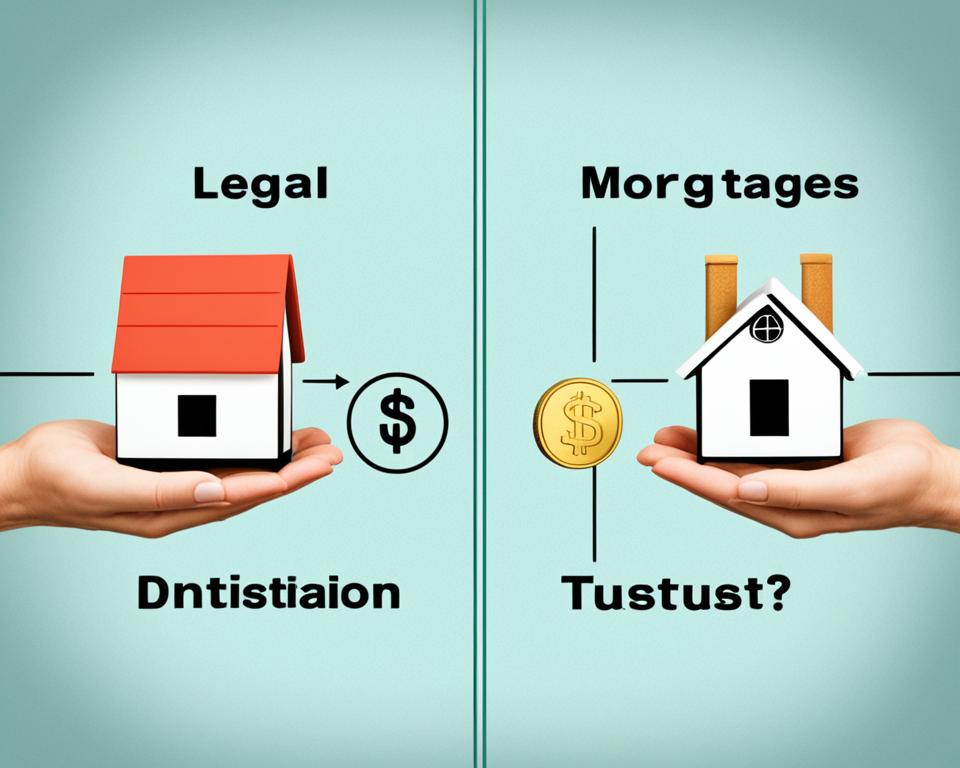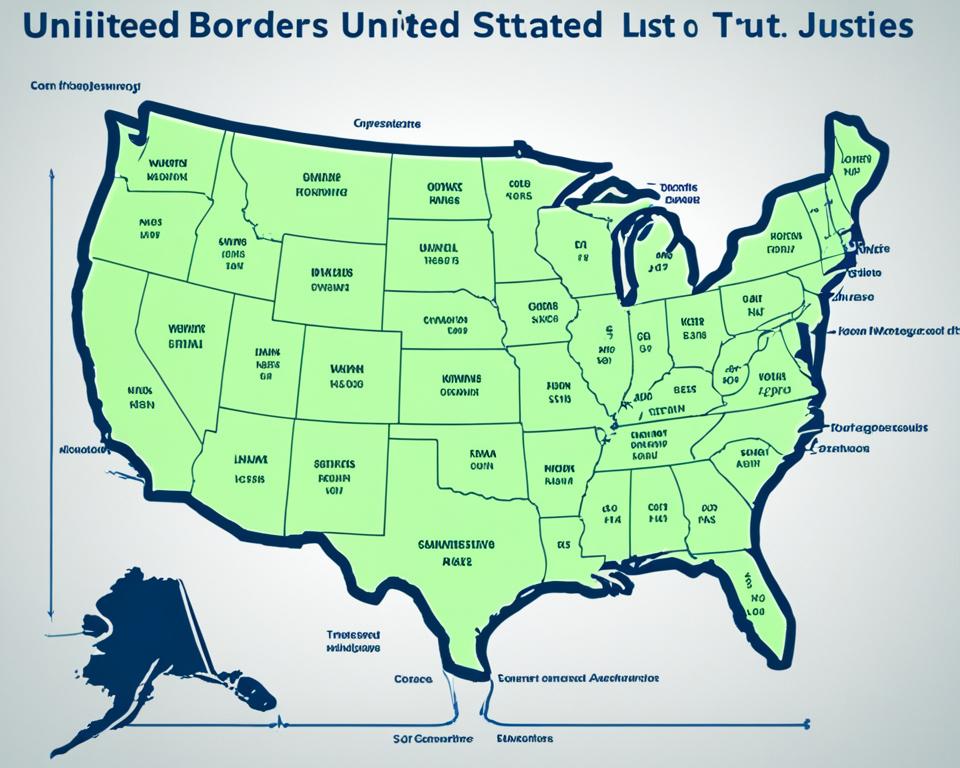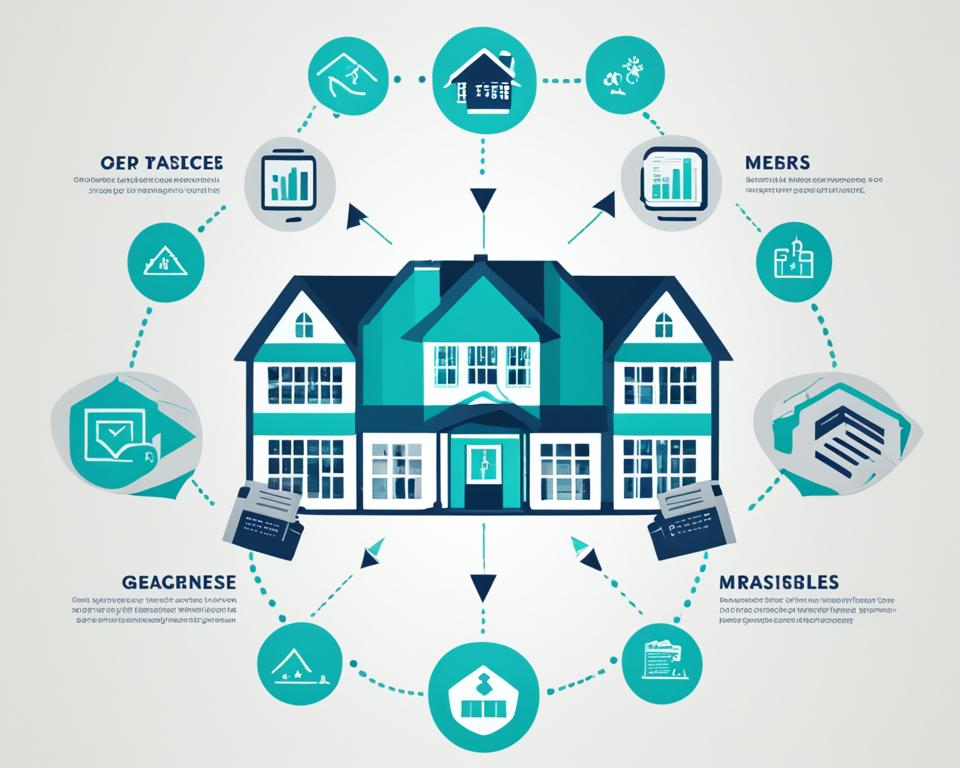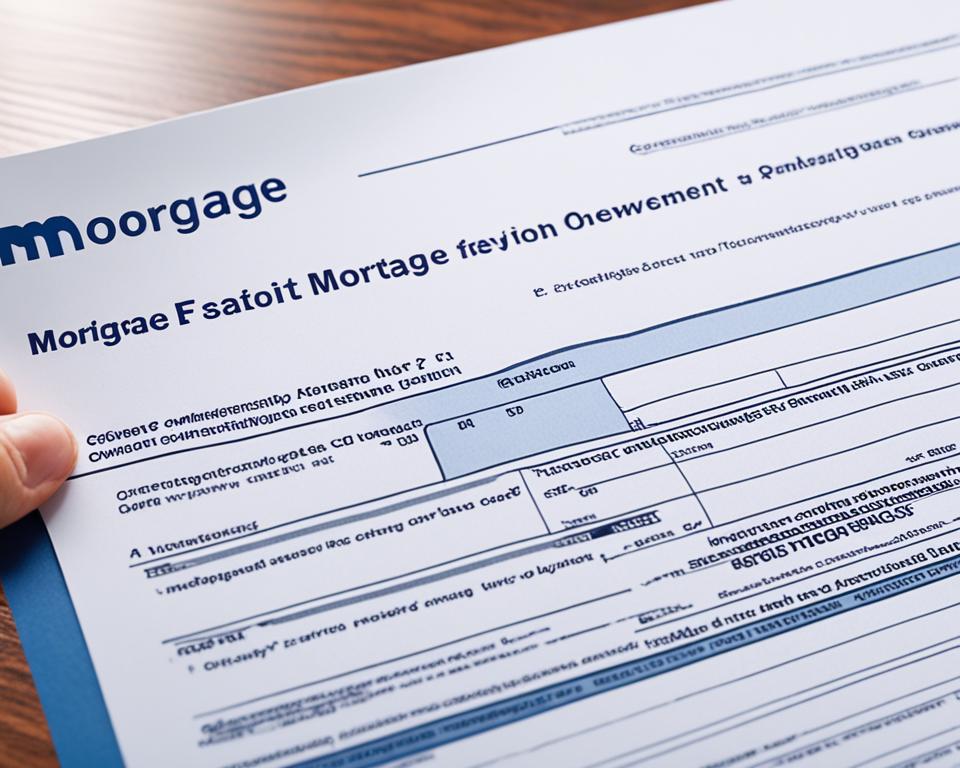
Mortgages or Guarantee Trusts, Which Is Better and Why
In the world of home loans and real estate financing, a big choice stands out: mortgage or guarantee trust? This choice heavily affects our financial plans, asset protection, tax implications, and wealth management. But, which one works best, and why?
Let’s look closely at these two loan security instruments. We’ll find out what makes them different and how they affect our financing strategies and wealth management vehicles. Learn with us about mortgages and guarantee trusts. We’ll see which option is better for our home financing options, investment property loans, and our general way of managing risk.
Key Takeaways
- Mortgages and guarantee trusts differ in the number of parties involved and the foreclosure process.
- Mortgages generally provide more protections for borrowers, with a longer foreclosure process and more opportunities to fight the foreclosure.
- Guarantee trusts allow for a quicker and less expensive foreclosure process for lenders.
- The choice between a mortgage or a guarantee trust is largely determined by state laws and industry preferences.
- Borrowers may not have the ability to choose between the two options, as the decision is often made by the lender and the state’s legal framework.
Understanding Mortgages and Deeds of Trust
What Is a Mortgage?
A “mortgage” is a contract that uses real estate as collateral for a home loan. The parties involved are the borrower (who pays back the loan) and the lender (who gives the loan).
What Is a Deed of Trust?
A “deed of trust” also uses real property to secure a loan. It involves the borrower (trustor), the lender (beneficiary), and a trustee. The trustee is a third party (like a title company) who holds the property’s title in trust.
The Parties Involved in Mortgages and Deeds of Trust
Mortgages have two parties: the borrower and the lender. Deeds of trust have three: the borrower, lender, and trustee. The trustee can sell the property if the borrower does not pay.
The main differences between mortgages and deeds of trust are the number of parties and how they work if the borrower does not pay. It’s important for buyers and investors to know these differences when dealing with loans for homes.

Similarities Between Mortgages and Deeds of Trust
Buying a home often means signing a loan, a promissory note, and a mortgage or deed of trust. The promissory note is where you promise to pay back what you’ve borrowed. With a mortgage or a deed of trust, you allow the lender to use the home as security.
This makes your home collateral for the loan. If you don’t pay, the lender can take the house. They do this by filing the mortgage or deed of trust in the local records. This way, they have a claim on your property if you don’t keep up with your payments.
Both Involve Securing a Loan with Real Estate
Whether you have a mortgage or a deed of trust, the house you buy is the loan’s guarantee. Since the home is the loan’s security, the lender can sell it if you can’t pay. They have the right to take the home through a legal process called foreclosure.
Promissory Note Signed by Borrower
Signing a promissory note is part of getting a home loan. This note includes details on your loan, like the amount, interest rate, and when you should pay. By signing, you agree to pay back the loan. This means you have to pay your mortgage or deed of trust on time.
Key Differences Between Mortgages and Deeds of Trust
Securing a loan with real estate has key differences in mortgages and deeds of trust. They differ in numbers of parties and how foreclosure happens. Knowing these differences is important for both those who lend and those who borrow.
Number of Parties Involved
In a mortgage, there are two parties: the borrower, who is the mortgagor, and the lender, who is the mortgagee. However, a deed of trust involves three parties. This includes the borrower, known as the trustor, the lender, called the beneficiary, and a trustee.
Role of the Trustee in Deeds of Trust
In a deed of trust, the trustee plays an important role. They hold the title of the property in trust. If the borrower fails to pay, the trustee can auction the property without court involvement. This makes the trustee’s role unique compared to someone in a mortgage situation.
Foreclosure Process
Foreclosure in mortgages is often done through the court system. It’s a longer and more costly process for lenders. Yet, deeds of trust can be foreclosed through a nonjudicial process. This lets the trustee sell the property at auction, making it quicker and cheaper for the lender.

Mortgages or Guarantee Trusts, Which Is Better
Choosing between a mortgage and a deed of trust depends on different things. This includes how hard it is to fight a foreclosure and the state’s laws. Mortgages give more safety to the people borrowing. They offer a longer time to work things out if there is a problem, like losing the home. But, deeds of trust make it easier for the bank to take back the home more quickly.
| Metric | Mortgages | Deeds of Trust |
|---|---|---|
| Foreclosure Process | Judicial foreclosure, taking months depending on the court | Nonjudicial foreclosure, typically faster at 2-6 months |
| Foreclosure Costs | Higher due to judicial process | Lower due to nonjudicial process |
| Borrower Protections | More opportunities to fight foreclosure | Fewer opportunities to fight foreclosure |
| Possession Enforcement | Court order to police for forceful possession if debtor does not vacate voluntarily | Administrative proceeding with the Ministry of Security, may lead to court auctions for a judge’s order |
The choice between mortgages and deeds of trust will go by what you are willing to risk, your feelings about getting the home back, and your state’s laws. Talking to experts at Gap Investments is a good idea. They can guide you through the good and bad of both. Then, you can decide what’s best for buying a home.

Advantages of Mortgages
Mortgages are helpful if you can’t pay your loan. In some cases, a court’s decision to take your home can take a long time. This delay can give you extra time to live in your home without paying.
Plus, if the foreclosure process requires going to court, it could be cheaper and simpler to join that case. This is compared to starting your own case if the process doesn’t go to court first.
Longer Foreclosure Process
With mortgages, the process of losing your home usually takes longer. This means you might get to stay in your house without paying for an extended period.
Easier to Fight Foreclosure
If the court is involved in the loss of your home, it might be easier to challenge. By joining certain court cases, you can dispute losing your home without needing to take separate legal action.
Overall, the way mortgages work can be a better deal for those struggling to pay. It gives extra protection to homeowners who might lose their homes.

Advantages of Deeds of Trust
Looking from the lender’s side, a deed of trust is often preferred. It allows for a quicker and cheaper way to take the property back. If the borrower doesn’t pay, the trustee can sell the home without going to court. This saves both time and money for everyone involved.
Quicker Foreclosure Process
When a property is sold under a deed of trust for not paying, it doesn’t require a court. Thanks to a power-of-sale clause, the trustee can sell the property directly. This means the lender can get their property back faster than the slower court process with mortgages.
Lower Foreclosure Costs
Lenders can save money and time with deeds of trust. Because they skip the court, there are no legal fees and other court-related costs. This makes the whole process of taking back the property cheaper and more efficient for the lender.
Choosing between a mortgage and a deed of trust depends on state laws and customs. Yet, it’s clear that deeds of trust offer benefits like quick foreclosing and savings. Knowing these can guide lenders to smart choices when providing loans in Costa Rica.

State Laws and Availability
The real estate industry’s rules, made with help from its supporters, decide if mortgages are needed for home loans. Many state laws say only one can be used, like Alabama and Michigan, that choose both options. In these special states, lenders like using deeds of trust. The reason is, this way, they can do foreclosures faster and cheaper.
States That Use Mortgages
Places like New York, New Jersey, and Massachusetts stick to only using mortgages for loans. In these mortgage states, foreclosing takes longer and is more detailed. This is done to give more help to those borrowing the money.
States That Use Deeds of Trust
But, states like California, Texas, and Florida only use deeds of trust. Here, in deed of trust states, the process is much faster. This is because it doesn’t need court action for lenders to take back the property.
States That Allow Both
A couple of states, like Alabama and Michigan, let lenders choose from a mortgage or a deed of trust. In these places, lenders often pick deeds of trust. This is because it’s quicker and costs less to take the property back, unlike mortgages that need more steps.

Choosing Between Mortgages and Deeds of Trust
When you think about home financing options, you might wonder about mortgages or deeds of trust. But usually, the choice isn’t yours to make. It depends on the real estate industry and the state laws in your property’s location. For Costa Rican homebuyers, it’s important to know the differences between these two loan security methods. We should be aware of the foreclosure process and how many parties are involved. Still, we might not get to pick the method for our home loan.
In certain states, lenders might prefer deeds of trust. This is because foreclosing is quicker and cheaper than through the courts with mortgages. But in other states, mortgages might be the only choice available. It’s key for Costa Rican homebuyers to understand these state laws and industry trends. This knowledge helps us handle home financing well.

At the end of the day, it’s our job to learn about mortgages and deeds of trust. This way, we can be smart in our decisions. We should also work closely with our lenders. This aims to ensure a positive and easy home financing journey, no matter the method we end up using.
Mortgage Electronic Registration Systems (MERS)
The MERS, or Mortgage Electronic Registration System, is a modern electronic registry. It was made by the lending industry to make the process of mortgage transfers and mortgage assignments easier. This system lets lenders save money by not needing to record each mortgage transfer the old-fashioned way.
Purpose of MERS
MERS acts as a nominee for the loan owner. It keeps track of the loan ownership tracking in an electronic database. As mortgages move from one owner to another, MERS updates this information. Consequently, lenders don’t have to handle separate assignments each time a loan changes hands, which saves time and money.
How MERS Works
At the start, MERS gets named as the nominee on the mortgage or deed of trust. When the loan moves to a new owner, MERS updates its system. This process allows for easy updating without paper or county recordings. Lenders enjoy smoother operations in managing mortgage transfers and mortgage assignments.

Thanks to the Mortgage Electronic Registration System, the lending industry now has a streamlined way to manage loan ownership. This change makes things better for lenders and borrowers. It does this by cutting down on administrative costs and making mortgage transfer processes simpler.
Transferring Mortgages and Deeds of Trust
Mortgage transfers happen a lot between banks and others. When a mortgage loan changes hands, it’s written down and put in county records. The paperwork that moves a mortgage from one owner to another is an “assignment of mortgage.” The process is similar for deeds of trust, with a recorded assignment when it moves from one party to another.
Assignment of Mortgage
Transferring a mortgage’s ownership uses a legal document called an assignment. This often occurs when loans are sold or packaged into securities. The new loan owner is then noted as the mortgage holder in the county where the property sits.
Assignment of Deed of Trust
For deeds of trust, there’s a similar process. A new lender or beneficiary is recorded when a deed of trust changes hands. This official step upholds a clear record of who owns the loan and its associated property rights.
Knowing how mortgages and deeds of trust change hands is important for many in real estate financing. Changes in loan ownership are routine. They help make sure a property’s legal details are correct and move smoothly with the loan.

Conclusion
The big differences between mortgages and deeds of trust come down to a few main points. This includes how many people are involved and how foreclosure works. Mortgages are between the borrower and lender and use a court process to foreclose. Deeds of trust involve the borrower, lender, and a third party. They can foreclose faster without going to court.
Deciding on a mortgage or deed of trust depends mostly on the state’s laws. Some places, such as Arizona, Colorado, and California, mostly use deeds of trust. Others, like Kentucky and South Dakota, use both types. When getting a home loan, borrowers often don’t get to pick which is used. They should still know the differences.
When it comes to mortgages, deeds of trust, home financing, loan security, foreclosure process, state laws, borrower considerations, and lender considerations, it’s important to understand the main points. This knowledge is critical when dealing with real estate financing in places like Costa Rica.
FAQ
What is a mortgage?
What is a deed of trust?
What are the main differences between mortgages and deeds of trust?
Which is better, a mortgage or a deed of trust?
How do mortgages and deeds of trust work in terms of securing a loan?
What is the role of the trustee in a deed of trust?
How do state laws affect the use of mortgages vs. deeds of trust?
What is the Mortgage Electronic Registration System (MERS)?
How are mortgages and deeds of trust transferred?
Source Links
- https://www.nolo.com/legal-encyclopedia/whats-the-difference-between-mortgage-deed-trust.html
- https://www.scb.co.th/en/personal-banking/stories/tips-for-you/mortgage-pledge-guarantee.html
- https://www.bankrate.com/mortgages/deed-of-trust/
- https://smartasset.com/mortgage/deed-of-trust-vs-mortgage
- https://gapinvestments.com/en/understanding-mortgages-and-guarantee-trusts/
- https://gapinvestments.com/en/mortgages-or-guarantee-trusts-which-is-better/
- https://www.credible.com/mortgage/deed-of-trust-vs-mortgage
- https://gapinvestments.com/en/costa-rica-investments/
- https://gapinvestments.com/en/faq/
- https://gapinvestments.com/en/inner-circle/
- https://www.ncoa.org/adviser/estate-planning/living-trust-vs-will/
- https://www.usbank.com/wealth-management/financial-perspectives/trust-and-estate-planning/types-of-trusts-which-should-i-choose.html
- https://gapinvestments.com/en/secure-loans-in-costa-rica/
- https://www.investopedia.com/terms/m/mortgage-electronic-registration-system-mers.asp
- https://www.rocketmortgage.com/learn/mers-mortgage
- https://www.nolo.com/legal-encyclopedia/what-is-mers.html
- https://www.gapequityloans.com/en/costa-rica-home-equity-loans-guide/
- https://legacyassuranceplan.com/articles/trusts/transferring-property-into-a-trust
- https://www.investopedia.com/terms/t/trustdeed.asp
- https://www.lendingtree.com/home/mortgage/deed-of-trust-vs-mortgage/
Article by Glenn Tellier (Founder of CRIE and Grupo Gap)
